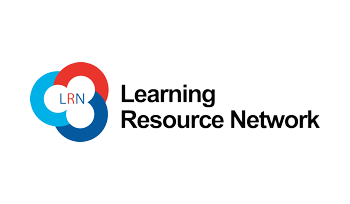Educational accreditation serves as a crucial quality assessment process for institutions, universities, and colleges, operating at both the institutional and programmatic levels.
At the institutional level, accreditation ensures that the organization complies with the law, possesses the capability to confer degrees, and adheres to the education regulations of the host country. This process safeguards the interests of learners by assessing facilities, teaching and learning conditions, and ensuring overall safety. Moreover, it evaluates the institution’s adherence to licensing requirements.
Programmatic level accreditation focuses on ensuring that specific programs meet high-quality standards. This includes verifying that learners achieve the intended learning outcomes, assessing the quality of teachers, and ensuring excellence in the teaching process. Programs that successfully pass programmatic accreditation gain recognition in the labor market and can seamlessly transition learners, with their training results cross-accredited by other peer education institutions.
It’s emphasized that an unaccredited educational institution cannot guarantee the qualifications and training competencies of its learners, impacting the institution’s overall reputation.
Level UK operates within a collaborative system established by the London Academy of Sciences (LAS) and the Swiss Institute of Management and Innovation (SIMI). Our programs lead to RQF National qualifications from accredited and recognized Awarding Bodies.
All Level UK programs align with the Regulated Qualification Framework (RQF) and are acknowledged by Ofqual in the UK. Additionally, they are compatible with the European Qualifications Framework (EQF), Australia Qualification Framework (AQF), African Continental Qualifications Framework (ACQF), and National Qualification Framework (NQF).
Level UK is a joint system between the London Academy of Sciences and the Swiss Institute of Management and Innovation. Level UK owns both LAS and SIMI’s institutional accreditation systems.
Accreditation at institutional level includes:
- The London Academy of Sciences (LAS) is a legally registered entity in London, UK, with the registration code from Intermediate to Doctorate training of 12965347.
- LAS is given a UKRLP (UK Register of Learning Providers) code number of 10087255.
- LAS has been approved to join the Skill Funding Agency system of the British Government.
- The Swiss Institute of Management & Innovation (SIMI) is a graduate and post-graduate training organization registered in Zug Canton, Switzerland, under license number CHE-258.08.017
- The Swiss Institute of Management & Innovation (SIMI) achieved the Premier status accreditation from ASIC.
Programmatic level accreditation focuses on ensuring that specific programs meet rigorous quality standards. This involves verifying that learners attain the intended learning outcomes, assessing the quality of teachers, and ensuring excellence in the teaching process. Programs that successfully undergo programmatic accreditation gain recognition in the job market and can smoothly transition learners, with their training results cross-accredited by other peer education institutions.
It’s underscored that an unaccredited educational institution cannot guarantee the qualifications and training competencies of its learners, impacting the institution’s overall reputation.
Level UK operates within a collaborative system established by the London Academy of Sciences (LAS) and the Swiss Institute of Management and Innovation (SIMI). Our programs lead to RQF National qualifications from accredited and recognized Awarding Bodies.
All Level UK programs align with the Regulated Qualification Framework (RQF) and are recognized by Ofqual in the UK. Additionally, they are compatible with the European Qualifications Framework (EQF), Australia Qualification Framework (AQF), African Continental Qualifications Framework (ACQF), and National Qualification Framework (NQF).
In collaboration with Ofqual-recognized Awarding Bodies, Level UK closely partners with prestigious and accredited institutions and universities in the UK and globally. Through this collaboration, learners at Level UK have the opportunity to attain a dual degree, seamlessly transition to partner programs, or have their results cross-recognized.
Our partners actively evaluate our programs, acknowledging the training outcomes, and concurrently awarding their degrees upon a learner’s successful completion of the Level UK program. This partnership enhances the educational experience, providing learners with broader opportunities and recognition in their academic journey.
- Diploma Recognition: Our diplomas boast full recognition both in academic spheres and the labor market, affirming their value and credibility.
- Academic Progress Options: Learners have the unique advantage of concurrently accumulating academic results, providing a spectrum of options. This includes transferring credits, progressing in their studies, or pursuing additional degrees through our esteemed partners.
- Flexibility in Learning: We prioritize flexibility, empowering learners to choose where and how they engage in their educational journey. This flexibility accommodates diverse learning preferences and lifestyles.
- Recognition of Prior Learning (RPL): Acknowledging the significance of prior learning experiences, our Recognition of Prior Learning (RPL) system ensures that learners’ existing knowledge and skills are duly recognized and integrated into their academic pursuits.
- International Accreditation with NQF: Our international accreditation aligns seamlessly with the National Qualification Framework (NQF), providing an equivalent qualifications recognition system. This global recognition enhances the credibility and portability of qualifications, facilitating diverse opportunities worldwide.
- Competency Evaluation: We ensure a thorough evaluation of candidates, aligning with industry standards of competency. This ensures that individuals are appropriately assessed for their proficiency, meeting the rigorous criteria set by the program.
- Level-Based Degree System in Recruitment: Our Level-based degree system facilitates easy determination of competency levels during the recruitment process. This is especially significant in Europe, where recruitment forms and job applications require the conversion of qualifications into Levels. This streamlines the understanding for both employers and candidates, fostering a more efficient and transparent recruitment process.
- Practical, Ready-to-Work Training: Candidates can seamlessly enter the workforce without the need for additional training due to our practical, RQF-based training system. This system prioritizes real-world applicability, focusing on cultivating skills that are immediately transferable to the corporate environment.
- Strategic Recruitment Based on Qualifications: We ensure precise recruitment by aligning individuals with the right positions based on qualifications and Levels achieved during each training period. This method guarantees a strategic match, clearly delineating the knowledge, competence, and level that candidates have acquired through their training. This ensures that individuals are appropriately placed according to their trained skill set and expertise.
In adherence to the UK’s national qualifications system, the Level UK training system holds accreditation from Ofqual and aligns seamlessly with the British framework, the Regulated Qualification Framework (RQF). The RQF, in turn, is designed to be compatible with the European Qualifications Framework (EQF), ensuring recognition not only within the UK but also throughout Europe. This compatibility extends to countries where their Qualifications Framework has been transformed or is compatible with the EQF. This interconnected framework enhances the international recognition and transferability of qualifications earned through the Level UK training system.
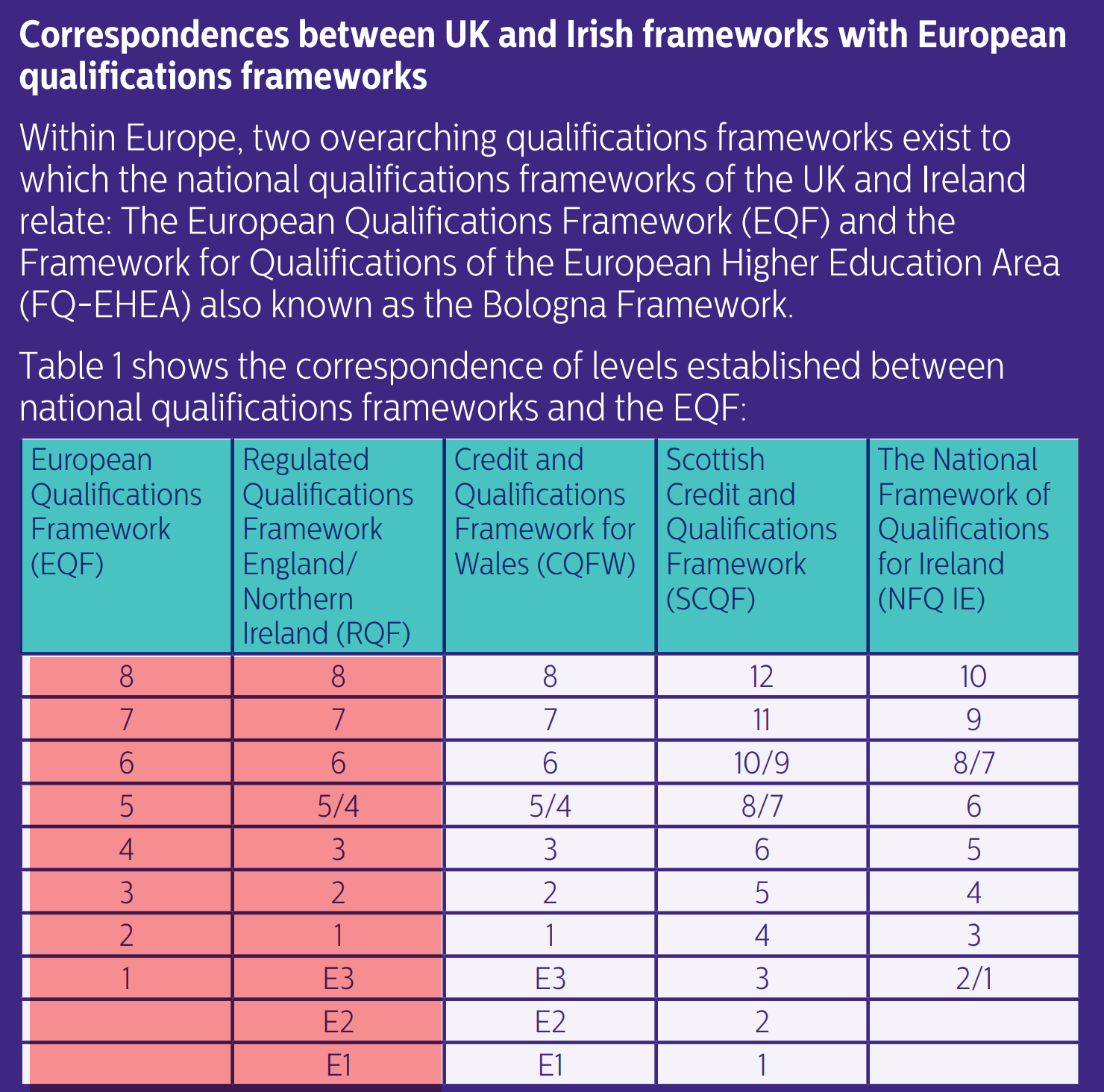
- Step 1: Enter the qualification comparison portal between European countries: https://ec.europa.eu/ploteus/en/compare
- Step 2: Select UK – England & Northern Ireland
- Step 3: Select 1 country you want to compare.
- Step 4: [Compare selected countries] will appear comparison between the levels accredited by Ofqual with other qualifications of European countries.
Example: The results of the comparison between UK Levels with France:
With this comparison table, you will find that the accreditation standard at the Level UK (accredited by Ofqual) will be equivalent to the French degree system. For example, Level 8 is Doctoral, Level 7 is Master, and Level 6 is Bachelor.
You can compare sequentially with countries: Denmark, France, Germany, Hungary, Ireland, Italy, Latvia, Estonia, Lithuania, Netherlands, Norway …
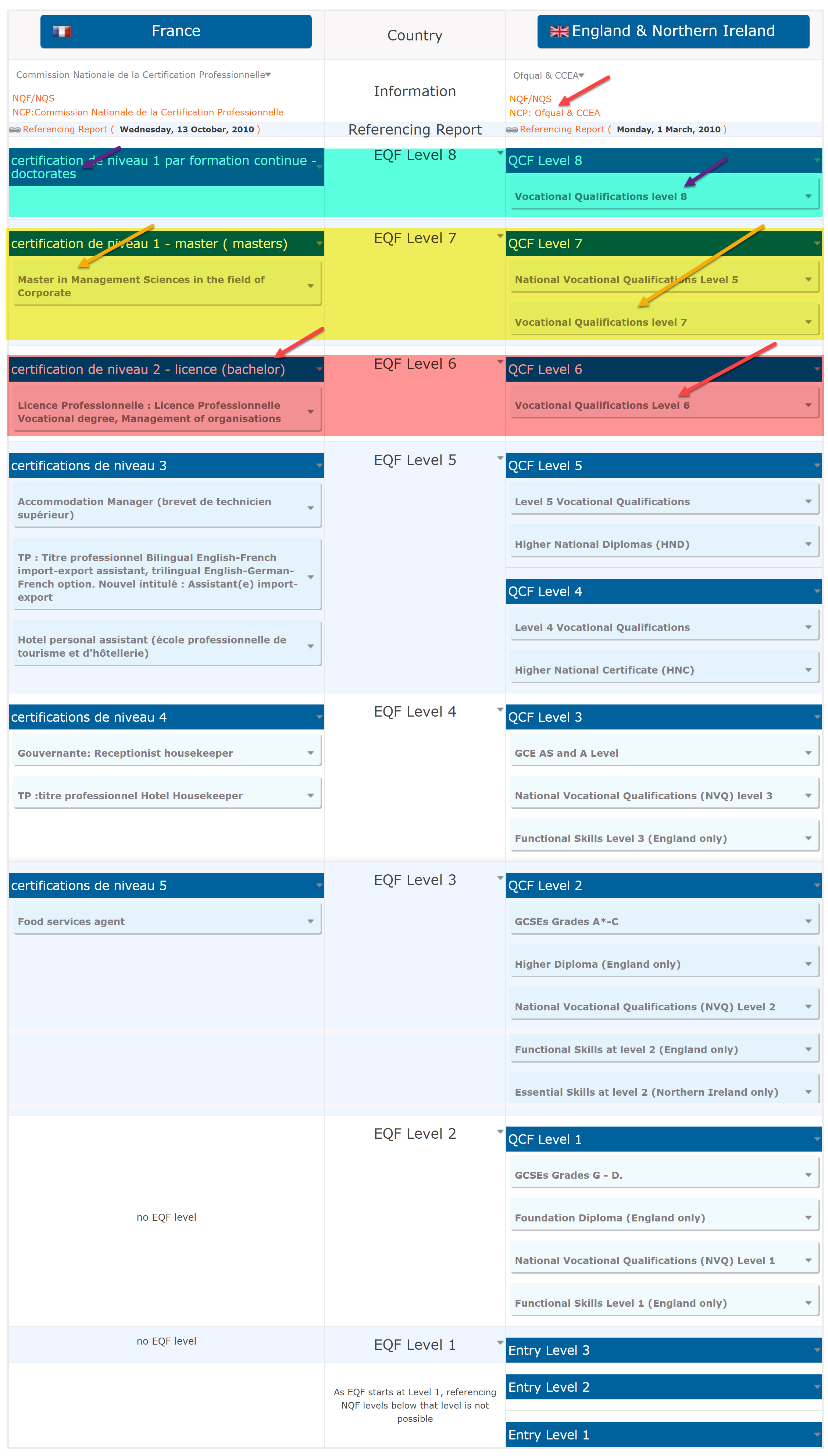
About UK NARIC (National Recognition Information Center)
UK NARIC is a UK government unit responsible for providing information and recommendations on higher education and practical training for countries and territories. As a government agency, managed by the UK government, under the Department for Education (DfE) of the UK, NARIC provides unified information about international education and systems outside the UK (in case learners with foreign degrees want to work-study in the UK).
UK NARIC is part of the NARIC system, originally established by the European Commission (EC) in 1984. The network was created to increase the recognition of equivalent diplomas among EU members, European Economic Area (EEA) countries, and coordination with Central and Eastern European countries, including Cyprus.
NARIC’s Diplomas accreditation system:
The structure, purpose, and training results of the international qualifications system are particularly diverse, so it is impossible to use a single method for assessment. The optimal approach that the UK NARIC uses is to focus on the comparative factors. Only when the UK NARIC determines that a qualification is equivalent in the UK does the UK NARIC begin to determine whether that qualification corresponds to any qualification in the UK system. Equivalent accreditation is both Level and Type recognition and must be done according to the UK NARIC Band Framework issued by NARIC.
UK NARIC Band Framework © is a hierarchical training level rating system, with equal recognition based on outcomes with 16 Bands, is designed to help optimize the degree comparison process while ensuring objectivity and equivalent qualification through the comparison process.
For each Band, the UK Naric Band Framework system also references some of the qualifications that exist in the UK and also the established standard framework for that type of qualification.
With the above point of view, with the legitimacy of information, UK NARIC’s qualification classification system is considered an accreditation system equivalent to an international qualification. Through this system, learners with foreign degrees can study and work in the UK using this system as an equivalent accreditation platform.
Level UK is the UK national qualifications system, accredited by Ofqual UK, so you can use the UK NARIC Band Framework to study and work in countries outside the UK, belongs to EU, EEC, Central Europe, Eastern Europe, and Cyprus.
UK NARIC Band Framework ©:
RQF Level 3 compatible with:
- According to the practical training system:: SCQF Level 6-7 / CQFW Level 3
- According to the academic training system: Overall standard of GCE Advanced / Scottish Advanced Higher / Scottish Baccalaureate / Advanced Welsh Baccalaureate
RQF Level 4 compatible with:
- According to the practical training system: SCQF Level 7 / CQFW Level 4
- According to the academic training system: Certificate of Higher Education (CertHE)
RQF Level 5 compatible with:
- According to the practical training system: SCQF Level 8 / CQFW Level 5 / Foundation degree / SQA Higher National Diploma (HND)
- According to the academic training system: Diploma of Higher Education (DipHE)
RQF Level 6 compatible with:
- Theo hệ thống đào tạo thực hành: SCQF Level 9 / CQFW Level 6
- Theo hệ thống đào tạo học thuật (Academic) Bachelor (Ordinary) degree / Bachelor (Honours) degree
RQF Level 7 compatible with:
- According to the practical training system: SCQF Level 11 / CQFW Level 7
- According to the academic training system: Master’s degree / Integrated Master’s degree (e.g. MEng, MChem, MPhys, MPharm) / Primary (or first) qualifications in medicine, (e.g. BM BS), dentistry (e.g. BDS) and veterinary science (e.g. BVSc) / Postgraduate Diploma / Master of Philosophy degree (MPhil) / Master of Research (MRes)
RQF Level 8 compatible with:
- According to the practical training system: SCQF Level 12 / CQFW Level 8
- According to the academic training system: Doctor of Philosophy degree (PhD) / Professional Doctorate (e.g. EdD, DClinPsy, DBA)
Reference: https://www.naric.org.uk/naric/Code%20of%20Practice/Band%20Framework.aspx
In Australia, when in the face of Australian citizens who move to other countries to study and work, and there is also a wave of foreign citizens coming to Australia to work and settle, Australia has also built its own Level system, called AQF (Australian Qualification Framework).
Unlike Europe and Asia, the AQF system is built on 10 Level standards. Although there is a difference in the number of Levels, there is a conversion equivalent to the European 8 Level system.
Below is a ranking of equivalent levels of Europe and Australia. For the European system, including the UK, Level 8 is Doctor, Level 7 is a Master, while in Australia, Doctor is Level 10, and Master is Level 9.
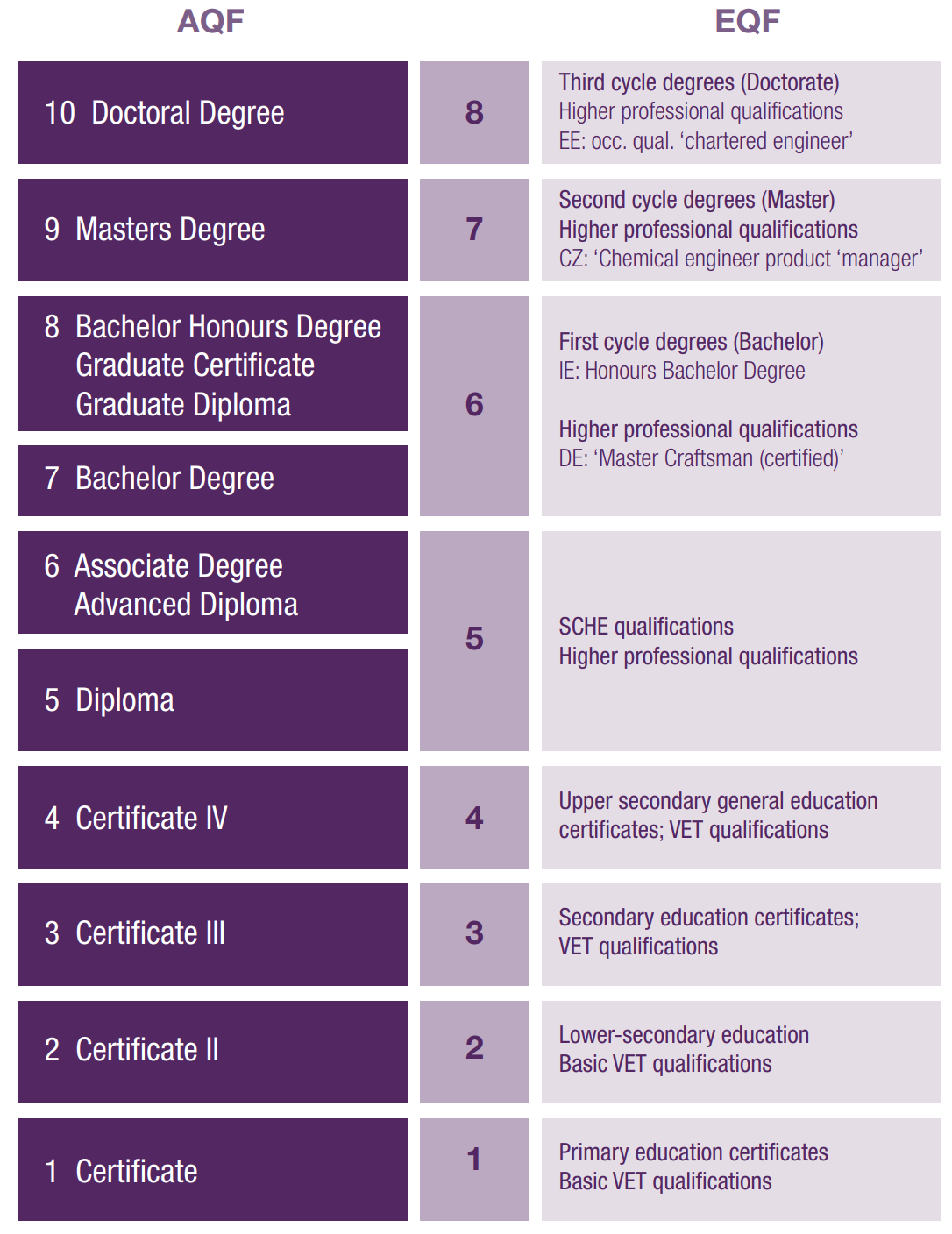
Refer to the AQF system documentation and the correlation between AQF and EQF (Europe) and the UK HERE
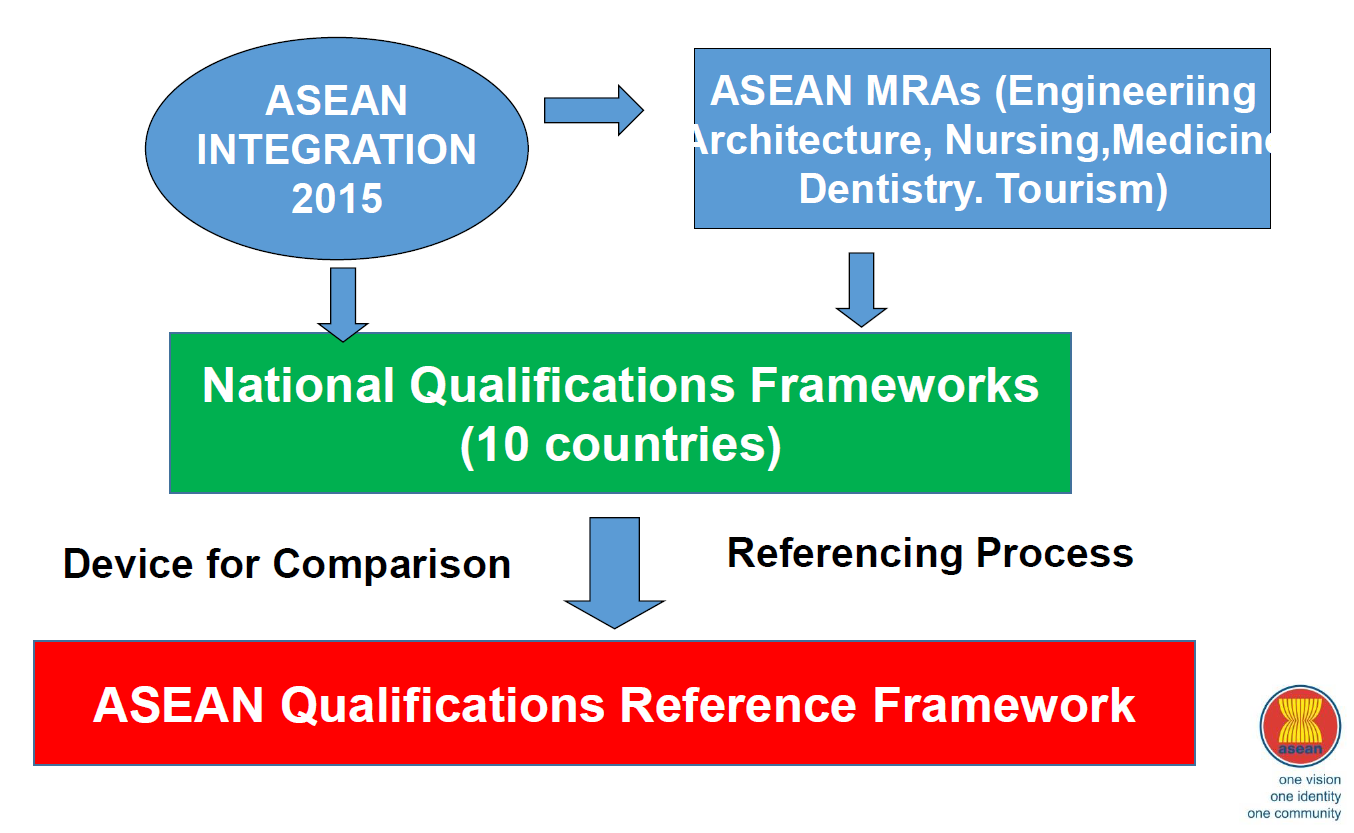
In Asia, the ASEAN community has also built a common ASEAN Quality Assurance Network according to 8 levels similar to the European Qualifications Framework (EQF). This system is fully compatible with Europe, Australia, and Africa’s system and has mutual recognition between the countries’ qualifications.
ASEAN 8 Level System:
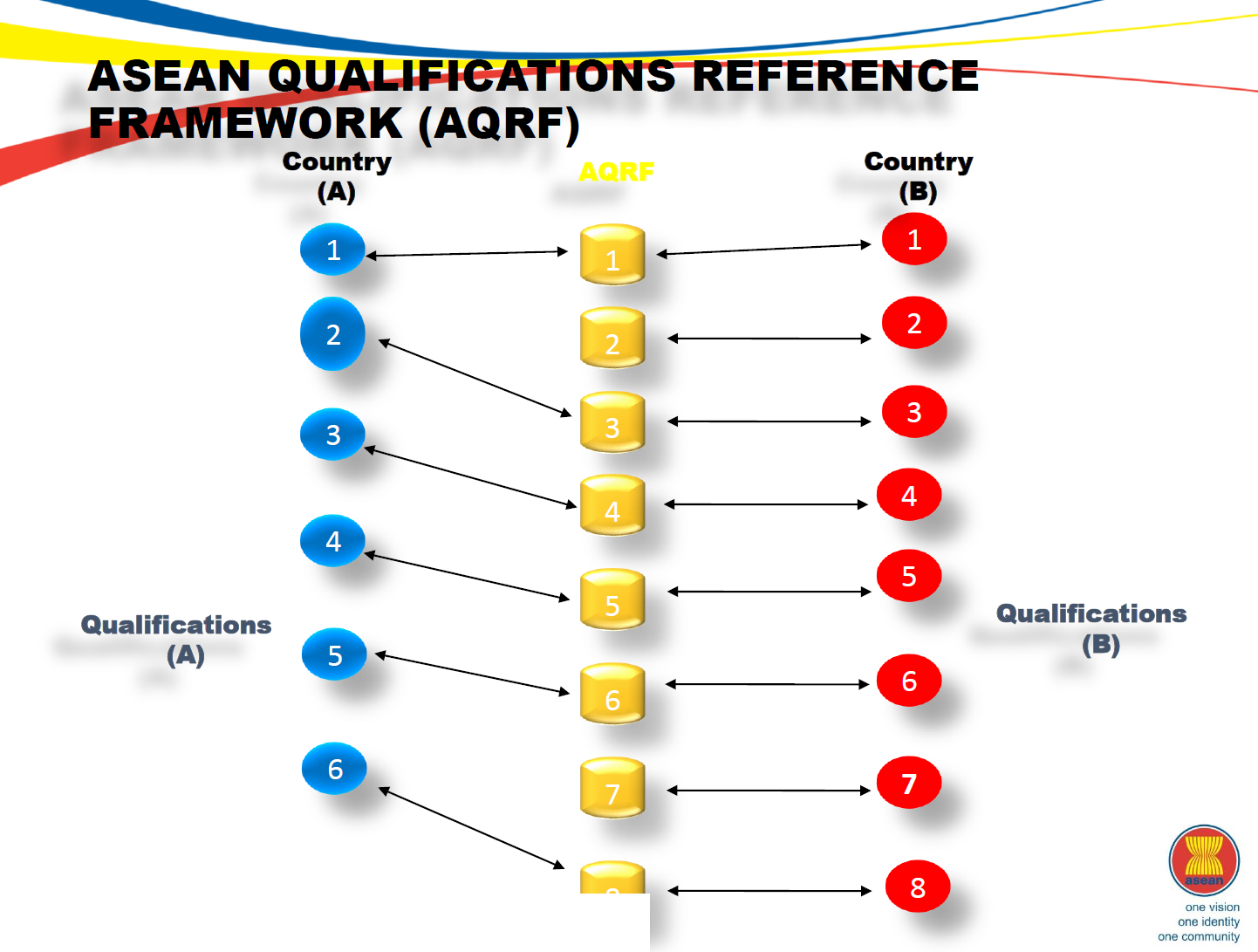
Currently, Malaysia and Singapore have completely applied this system. The rest of the ASEAN countries are in the stage of implementation.
The building of a common Asian framework according to 8 Levels helps a degree in a country be recognized immediately upon entering the foreign labor market. Besides, due to the compatibility of the Asian framework with European, Australian frameworks … the orientation of learning by Level from the beginning helps students receive, recognize, and keep the salary level when the labor market has no borders.
- The Ofqual Awarding Bodies, including OTHM, ATHE, and others, only grant degrees and recognize academic achievements when students fully meet academic and financial requirements, adhere to academic discipline, and comply with other regulations. In the event of a breach of commitment, absence without notice, or discontinuation of the program without prior notice, SIMI Swiss and the London Academy of Sciences reserve the right to refuse admission, withdraw support, cancel student status, and withhold reimbursement of tuition and fees.
- SIMI Swiss, the London Academy of Sciences, and their partners do not guarantee the acceptance of a degree by third parties. Acceptance or rejection is at the discretion of the receiving entity. Additionally, SIMI Swiss, the London Academy of Sciences, and their partners do not guarantee salary increases, promotions, new job opportunities, or job acceptance after graduation.
- While regulations regarding cross-recognition and equivalence of qualifications exist, each country, organization, and entity reserves the right to recognize its own degrees. Therefore, SIMI Swiss, the London Academy of Sciences, and their partners do not guarantee automatic recognition of degrees during the diploma and certificate usage process, including transcripts from Paris-U and other institutions. They also do not support or guarantee the process of recognizing equivalent qualifications, if any.
- Furthermore, SIMI Swiss, the London Academy of Sciences, and their partners do not commit to providing opportunities for immigration, working abroad, obtaining work permits, teaching permits, or professional licenses in Europe or any other country.
- SIMI Swiss, the London Academy of Sciences, and their partners do not provide any support for obtaining student visas.


